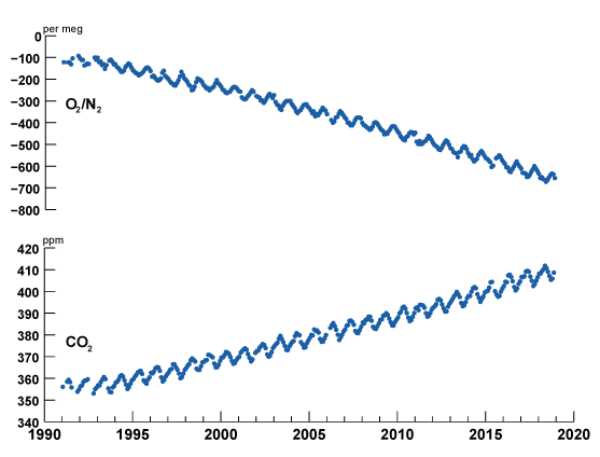Scripps O2 Program Data
About this collection
- Extent
-
4 digital objects.
- Cite This Work
-
Keeling, Ralph F. (2019). Scripps O2 Program Data. UC San Diego Library Digital Collections. https://doi.org/10.6075/J0WS8RJR
- Description
-
This archive presents time-series measurements of atmospheric O2/N2 ratio and CO2 mole fraction from flask samples collected by the Scripps O2 program at twelve fixed land stations. Ten of these stations form an active network from nearly Pole to Pole along a Pacific transect. The earliest results in this network (from La Jolla) date from 1989. The remaining two stations are “legacy stations”, where flasks are no longer collected. Flasks are collected under atmospheric conditions designed to minimize the impact of any local process such as fuel burning that might impact atmospheric O2 or CO2. The sampling frequency is typically ~ 2 weeks.
The O2/N2 ratio is reported as relative deviation from reference in δ units: δ = ((O2/N2)_samp /(O2/N2)_ref ) – 1, where (O2/N2)_samp is the O2/N2 mole ratio of the sample, (O2/N2)_ref is the ratio of a long-term reference. The quantity δ is multiplied by 10^6 and expressed in “per meg” units. Changes in CO2 are reported in “ppm” units, i.e. µmol CO2 per mole of H2O -free air.
The Scripps O2 program has been directed throughout its history by Prof. Ralph Keeling. The program began while R. Keeling was a postdoc at the National Center for Atmospheric Research in Boulder, Colorado, and was moved to the Scripps Institution of Oceanography in 1993.
The O2/N2 measurements are made on a custom interferometric analyzer, while the CO2 data use a Siemens non-dispersive infrared analyzer. Sampling, analysis, and calibration methods are described in Keeling et al (2007) and Keeling et al (1998).
The Scripps O2 program is operationally independent from the Scripps CO2 program in using different flasks and analysis systems. The CO2 records of these two programs are therefore substantially independent, even though the flasks for both programs are collected at many of the same stations. - Scope And Content
-
The Scripps O2 Program website at http://scrippso2.ucsd.edu provides access to openly available atmospheric O2/N2 ratio and CO2 concentration data from various sources. Redundant copies of the atmospheric O2/N2 and CO2 data from 12 sampling stations are being deposited here, through the UC San Diego Library, to provide enhanced discovery, long-term accessibility, and preservation. The latest data archives from the 10 active stations are added to this collection as they become available.
- Date Collected
- 1989 to present
- Date Issued
- 2019
- Creator
- Director
- Contributors
- Note
-
Data Usage:
The data and graphics on this website are made freely available, with the understanding that appropriate credit will be given. For applications supporting peer-reviewed scientific publications, coauthorship may sometimes be appropriate. An example would be if an important result or conclusion depends on this product, such as the first account of a previously unreported phenomenon. Ethical usage requires disclosing intentions at early stages of the work in order to avoid duplicating ongoing studies at Scripps. For applications where coauthorship is not needed, which includes all applications outside of the peer-reviewed scientific literature, it is sufficient to acknowledge the Scripps CO2 program as the source. Please direct queries to Ralph Keeling (rkeeling@ucsd.edu). - Funding
-
The Scripps O2 program has been supported by a series of grants from the National Science Foundation (NSF) and the National Oceanographic and Atmospheric Administration (NOAA), most recently 1922922 and NA20OAR4320278.
In kind support for field operations is provided by the Australian Bureau of Meteorology, Environment and Climate Change Canada, and the US Weather Service and NOAA. - Topics
Formats
View formats within this collection
- Language
- English
- Identifier
- Related Resources
- Scripps CO2 Program Data at UC San Diego Library: https://doi.org/10.6075/J0542KSG
- Scripps CO2 Program: https://scrippsco2.ucsd.edu
- Scripps O2 Program: http://scrippso2.ucsd.edu
- Keeling, R. F. and A. C. Manning (2014). Studies of recent changes in atmospheric O2 content. Treatise on Geochemistry, Volume 5. R. F. Keeling and L. Russell. Amsterdam, Elsevier: 385-404. https://doi.org/10.1016/B978-0-08-095975-7.00420-4
- Keeling, R. F., A. C. Manning, E. M. McEvoy and S. R. Shertz (1998). "Methods for measuring changes in atmospheric O2 concentration and their application in southern hemisphere air." Journal of Geophysical Research-Atmospheres 103(D3): 3381-3397. https://doi.org/10.1029/97JD02537
- Keeling, R. F., A. C. Manning, W. J. Paplawsky and A. C. Cox (2007). "On the long-term stability of reference gases for atmospheric O2/N2 and CO2 measurements." Tellus Series B-Chemical and Physical Meteorology 59(1): 3-14. https://doi.org/10.1111/j.1600-0889.2006.00196.x
- Manning, A. C. and R. F. Keeling (2006). "Global oceanic and land biotic carbon sinks from the Scripps atmospheric oxygen flask sampling network." Tellus 58B: 95-116. https://doi.org/10.1111/j.1600-0889.2006.00175.x
Related data
Reference
 Library Digital Collections
Library Digital Collections
